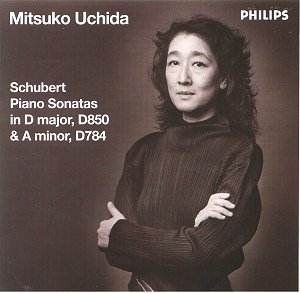Franz SCHUBERT
Piano Sonatas:
No. 17 in D, D850;
No. 14 in A minor,
D784.
 Mitsuko Uchida
Mitsuko Uchida
Recorded in 1999; issued
2000
 Philips 464 480-2 [DDD]
[62.03]
Philips 464 480-2 [DDD]
[62.03]
Crotchet

Mitsuko Uchida is very slowly working through a Schubert Sonata cycle which
has been widely acclaimed, although some critics have not been happy with
very slow tempi in certain movements. The present disc presents Schubert
in two highly contrasting moods.
The Sonata in D major was written in the summer of 1825 when he had spent
an extended tour of upper Austria and was written in the spa town of Gastein.
It is one of the most brilliant and outgoing of all his piano pieces. The
first movement is very rhythmic and sounds rather like Beethoven, it is played
here with great verve and precision. Both the second movement and much of
the scherzo are dominated by very slow and expressive playing, with considerable
dynamic range. The finale has a charming "tick-tock" accompaniment which
is very different in spirit from the preceding movements and which gradually
fades into the distance with a slow hushed coda, making an unexpected end
to this mainly extrovert work which is managed very well in this recording.
The A minor Sonata dates from 1823 and is a much bleaker work, overshadowed
by his response to the syphilis which was to end his life. The work is
exceptionally cold and austere. The very long opening movement opens with
a slow mysterious theme which dominates the movement and alternates with
short violent episodes, very well played in this recording. The slow movement
is played softly and very slowly so that it almost comes to a halt. The last
movement has a main theme played very quickly with a contrasting slow theme
which looks back to the previous movement, the mood is defiant rather than
heroic and this movement is particularly well balanced here.
Overall the recording, on a 1962 Steinway, is excellent in every way. The
playing exemplary; every note exactly in place and carefully planned. It
is very much a performance of the 21st Century with wild precision in the
quicker passages contrasting with very slow and often very quiet andante
passages. Many listeners, including this reviewer will prefer an older style
of Schubert playing as achieved by artists such as Artur Schnabel and Clifford
Curzon who can obtain magical effects without extremes in tempi or dynamics.
Reviewer
Arthur Baker

